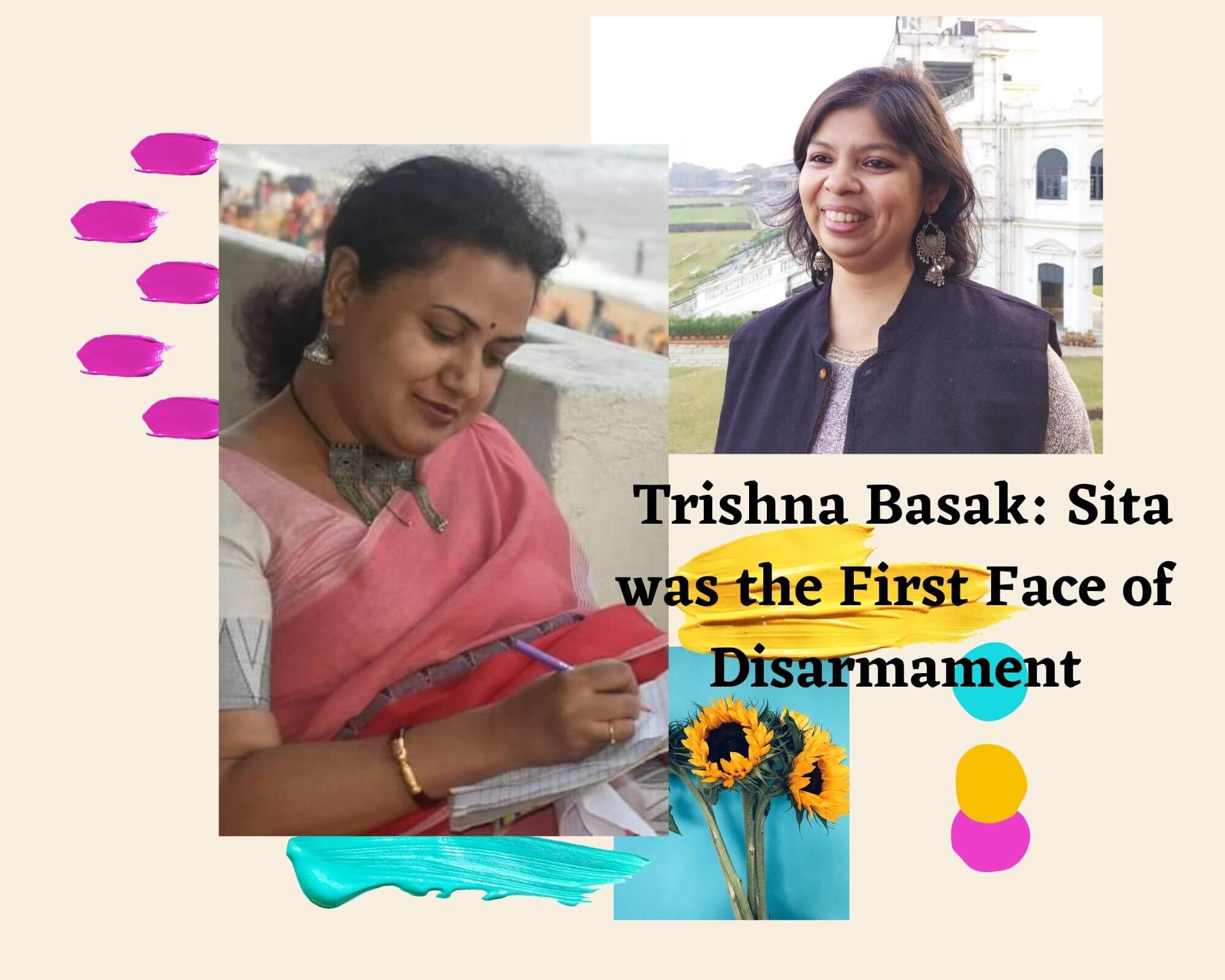In a candid interview, Trishna talks about various issues, technology for women, Ecofeminism, Cyber Feminism, disarmament, et al, with Nanabita. An exclusive for Different Truths.
Trishna Basak is one of the most powerful voices in Bangla literature today. Primarily a creative writer and translator with several awards to her credit, she is keenly aware of the gender inequality that still pervades the society. In one of her recently published books, Prajukti o Nari (Technology and Woman), she raises some very pertinent questions regarding women’s relationship with technology and exposes the deep-rooted prejudices that prevent women from developing meaningful engagements with any kind of scientific knowledge.
Though things are changing slowly, there is a lot of work that needs to be done in this field and Trishna’s book is one of the steppingstones towards building this awareness. An engineer with an acute sense of history, she delves into the past and explores the present to understand what the future holds. This book is just the beginning of a necessary dialogue, a lot more detailed study is required and as she says in the interview, each chapter can be converted into a single book. This is the promise that Prajukti and Nari holds out for its readers and might be the spearhead of a whole new series of interactions between women and technology.
In this interview, Trishna shares her thoughts about the relationship between women and technology and what led her to write this book.

Nabanita: Trishna Basak, you are a popular poet, storyteller, translator of Bangla. Then why did you choose to move to the genre of non-fiction and write on this topic?

Trishna: In the late nineties I chanced to read ‘Future Shock’ by Alvin Toffler which left an everlasting effect on me. My thought process changed. I started to notice the changes within the society due to technological progress. And as you know, a revolutionary change came from the very beginning of nineties -globalisation and explosion of information technology. It is not that I was a mere spectator, but being an Engineering Graduate, I was a part of it. I clearly remember that we learnt BASIC, DOS and all such computer programs in our computer classes, but when we joined the industry, we had to learn C++, Windows, etc which were just being introduced then. As an Engineering student and as an employee in the male dominated Engineering industry, I faced many challenges. All these led to sharply focus my thought on the relation between women and technology. I discovered that most of the women used technology as its user, but very few were innovators. I could visualize a book, page by page, chapter by chapter, and when a publisher approached me to write a nonfiction book on women, I ended up writing this book in less than two months. I had been conceiving this for years.
As you know, this is the first book of its kind dealing with this subject. Someone had to write this. So why not me? My poet or fictionist self has never interfered with it.

Nabanita: Technology in a woman’s life is like a strange man, the proverbial porpurush (the other man) in Bangla is what you say. Being an engineer yourself, how do you look at your relationship with science and technology?

Trishna: I have seen that from the very beginning a girl child is discouraged to use technology or study science. It is like a myth that people say girls are weak in mathematics.
It is expected that girls will study humanities and boys will take up science, engineering, or medical fields. In almost every household, girls are prohibited from fixing a fuse or changing a stepney, as if science and technology is a male area. I think it is a habit developed in colonial Bengal. Before the advent of foreign technology, our women, using the available rural technology, were a part of cotton production. They even invented a husking machine or dheki, though it has never been recognised.
The invasion of Muslims, followed by European colonization, on one hand, and on the other, giving less importance to application of science and technology in everyday life as compared to the theories, have been responsible for restricting women’s world.
What I intend to say is that in the varnasrama system or caste-based system a culture developed where all importance was given to the intelligentsia of the Brahmins who studied Vedas and gathered theoretical knowledge. But the artisans, who built houses, ships, or utensils, were Shudras and that’s why their technical expertise was never recognised. This led to an unhealthy imbalance between theory and practical knowledge in society and thus there was no industrial revolution in India like that in the West. Like the shudras or artisans, women also had immense technical skills as is evident from their use of charkha to make the sacred thread and so many other activities in their leisure time. But all these were never explored. This mindset has hindered the growth of technology as well as women’s participation in technology.

Nabanita: You have illuminated the reasons behind such apathy in technology among women. Still, for our readers here would you like to repeat it in a nutshell?

Trishna: To name just a few:
- – Lack of awareness
- – Myths regarding women’s intelligence, such as girls are poor in mathematics
- – Discouraging women from studying science and technology
- – Stereotypical portrayal of scientist and technocrat in literature and cinema as male-only
- – Different toys given to male children and female children, like aeroplane and mechanic set to boys and dolls to girls.
- – Different types of work allotment to male child and female child
- – Not too many female scientist role models to follow
- – Lack of women-friendly environment in the industry like ladies’ toilet, sanitary napkin vending machine, etc.

Nabanita: Very interestingly you have highlighted the traditional use of science in running households which has been the stronghold of women. In other words, women have been unwittingly participating in an organic and holistic use of science in their daily lives. What more can be done in the practical sphere to popularise this line of thought and make women aware of their age-old relationship with technology?

Trishna: To achieve this, I think, women should be provided with some considerably basic hands-on knowledge of technology rather than high level theoretical knowledge. They should be given exposure to use all sorts of domestic gadgets, should be encouraged to fix fuse or change car tyre or other such everyday chores involving gadgets.
And we must keep in mind that a vast unexplored women’s scientific talent lies in rural areas. To tap them, the teaching of science and technology must be through vernacular languages, and writing project papers and presentations also should be allowed in one’s mother tongue.

Nabanita: Your views on tapping the unexplored scientific talent hidden in the rural life of our country brings us to what ecofeminists around the world have been talking about and what you have also discussed in this book – that is an organic way of living. So do you think the future well being of the earth is in the hands of women, the traditional nurturers?

Trishna: Ecofeminism deals with the close relationship of women with nature. From the very beginning of civilisation, women have played a significant role in conservation of nature and natural resources. They have conserved forests, regularly fed domestic animals, and took care of them, and they have travelled miles after miles to collect water. In the ‘Bratokathas’ generally read by Bengali women during rituals, we see how women worshipped nature in their rituals. We also find Sita of Ramayana, who is stereotyped as a very docile woman, protesting Ram’s unnecessary use of weapons in the forest. She may be called the first face of disarmament. The first ever book making us aware about the dangers of overuse of technology, was also written by a woman- Rachel Carson, you know, the book, Silent Spring. There are also examples of numerous movements around the world to save nature, which are led by women, such as the Save Narmada mission, Chipko movement, Green Bracket movement, etc. In recent times, we are incredibly happy to see a very young girl, Greta Thunberg, kindling a worldwide movement on the dangers of global warming.
I really believe women are going to be the survivors of the world.

Nabanita: Don’t you think even women have gone far away from the organic lifestyle in this age of all devouring machines? Whatever traditional knowledge is left is perhaps with a few indigenous races which is also fast disappearing. What is your perspective on that?

Trishna: It is true. Women are equally victims of consumerism. Big corporate houses using big technology think only of profit. They do not bother about conservation of nature. What we really need is sustainable development for which small technology, rural technology, and traditional knowledge is particularly important. I have read in Joya Mitra’s writing that in Rajasthan, a remarkably effective method of storing water has been restored after ages which the Rajasthani women had been passing from one generation to another generation. All such traditional knowledge is mainly conserved by rural women. Blinded by the westernized lifestyle, we have ignored them. We have never thought of educating these women and using their knowledge.
We have to change our mindset for that.

Nabanita: Your book has a definite feminist edge to it. How much has feminism helped in familiarising woman with technology? Do you think there has been any work at all in this direction?

Trishna: Feminism has helped a lot. There is in fact a term, feminist technology, which works for inventing technology keeping in mind the needs and desires of women and thus fight patriarchy. It has been found that cars, public toilets, voice recognition software, most of the available gadgets and technologies – are all designed keeping in mind the need and body type of males.
In my next book I will try to explore this aspect.

Nabanita: You have dedicated chapters on Ecofeminism, Cyber Feminism. These terms are very much in vogue these days. But how much do you think these terms are meaningful outside of the academic circles?

Trishna: It is true that there is very less reading material available on these subjects in India, not only in Bengali, but also in English and other Indian languages.
I did not get many materials while writing this book. Hence, I have decided, besides my creative writing I will keep on studying these fields.

Nabanita: Female body has been the site of contest and violence since ages. When you talk of the anonymity of cyber feminism, do you think this body of the woman becomes irrelevant? If that be so, where and how do you situate cyber crimes directed against the woman and her body.

Trishna: Yes, in the cyber age women’s bodies become irrelevant theoretically. Because one is not bound to disclose his/her gender identity here. But unfortunately, here also women have become a soft target for all sorts of cyber crimes. Her photograph can be morphed and used in pornography, she may be trolled for no reasons or may be trapped in the name of love. The Internet is not neutral. Even the computer games have a macho look.
Moreover, virtual reality can lead to serious depression, women may be disconnected from the real world and live in a virtual cocoon. To overcome this, women should learn how to use cyberspace effectively, not to be used by it.

Nabanita: Towards the end of the chapter, ‘Not a Goddess of the Machine, but it’s Servant’ (Jontrerdebi noy, sebadasi) you talk about how men use technology for business and women for interpersonal relations. Are we then, somehow, once again falling in a stereotyping of the gender? Or is there hope that the asexual world of machines can negate that?

Trishna: A person may have three types of relation with technology:
- 1 inventor
- 2. User
- 3. Used.
Unfortunately, the first type is exceedingly rare among women. For centuries, women were not allowed to use technology. Till today, the majority of the women are employed in the clothing industry, telegraph and telephone sectors, and then in Information Technology. But there too, women are employed at mere keyboarding level, and only very few get employed as high-level programmers.
With the advent of mobile phones and social media, more women are seen using these. But what they do is mere socialising, just an extension of the kitty party, using technology.
But If we study the evolution of Computer Technology, we can find remarkable contributions from women inventors, starting from Ada Lovelace, Gracy Hopper to name a few. Today’s women must be aware of their contribution and try to be the Master of Technology, not a mere servant.

Nabanita: Continuing in the same note as the above question, nari or female today means both cis and trans women. What role do you think this whole world of machines and technology can play in empowerment of all these voices in the margin?

Trishna: That is an especially important question. In my book, I have shown that cyberspace has provided a gender-neutral platform for women, where her gender identity is not only unimportant but also irrelevant.
This space gives freedom from gender identity. Hence people with marginalised gender identity can use this space to their benefit if they wish to. But at the same time, as this is a frictionless path, it has some dangers too.

Nabanita: You end the book in a hopeful note, ‘The doors open, now is the age of women in Technology’ (dorja khulche, ebar projuktir stree-porbo) where you talk about the inevitability of machines in our lives. Can you, in brief, talk about the silver lining that is still there inspite of a constant effort to keep women and technology apart?

Trishna: I see there is an increasing awareness about women’s participation in STEM. Slowly but steadily the prevalent mindset of industry and institution is changing. But the main obstacle comes from home. All over the world women work almost 24 hours at home for which they do not get a salary. Their energy and talent are wasted thus. For achieving the best position as scientist, first there should be gender equality at home.

Nabanita: Finally, do you have any plans for expanding the work that you have started here?

Trishna: Yes. I long to write each chapter of this book elaborately. You know the chapter on Cyberfeminism, or Ecofeminism can easily be the subject of a separate book. I have plans to write about the machine’s sexuality. But it may take my entire life to chase these dreams.
Photos by the author and visual by Different Truths





 By
By

 By
By
 By
By
An enlightening interview…as a student of folklore and hence trying to always locate traditional knowledge, this interview reaffirmed many of my views and opened windows for other explorations. I am yet to read Trishna Di’s book but I will do it very soon. And thank you Nabanita for the interview.
Thank you for reading the interview Averi and am sure you are going to enjoy the book too.
Hopes surge reading such inspirational comments.
Waiting to read more from Trishna Basak
Our mindset needs to be changed and time has approached to acknowledge a girl child’s intellectual mettle.
The interview has so meticulously been organised that reading became a wonderful experience.
Thank you Nabanita and Trishna to take a step forward towards this awareness.
Thank you for the detailed reading and for your detailed comment Ratna di
Hopes surge reading such inspirational comments.
Thank you Nabanita for the wonderful interview.
Waiting to read more from Trishna Basak
Our mindset needs to be changed and time has come to acknowledge a girl child’s worth.